Larry’s Market owner Ryan Dennis has brought in chef Haley Parrent to prepare menus for specific dietary needs. Photo by Mike Wakefield/North Shore News
Since opening it’s doors this July, vegetarian grocery store Larry’s Market, located at North Vancouver Shipyards, has been a big hit with Vancouverites looking to buy healthy food, conveniently! VHS asked Ryan Dennis, the owner of Larry’s Market, what inspired his new venture, after spending the past 25 years in the grocery industry, before deciding to open his own store.
What inspired the opening of Larry’s Market?
My wife was diagnosed with Breast Cancer in 2017. We had to make some decisions on what healthy eating looked like for our family after this health scare. After researching, we decided that a plant-based diet was the way to go. We weren’t able to find a lot of options in grocery stores, so we decided we would create an option. We are happy we did and now we successfully serve North Vancouver’s Shipyards District with Vegetarian groceries, coffee and grab and go restaurant food. My wife is now healthy and is helping me run Larry’s Market.
Why do you think it’s a good time to open a plant-based business?
We feel that communities are shifting to more plant-based diets. People are eating less meat and seafood. The timing is great because people are being educated by the many documentaries and reports that are continually being released that support plant-based diets.
What demographics will you be targeting?
The demographic is all across the board. We are seeing young people that are educating themselves and retired folks that are looking for “food as thy medicine”. The professionals that are on the go and looking for a convenient meal are returning for their favourite salad, sandwich or pizza daily.
What has the response been so far from Vancouver consumers?
Vancouver has accepted us very well. We are seeing people from all over the Lower Mainland that are making us a destination. People are always asking us to expand to their neighbourhood so they don’t have to drive over to the North Shore.
Everything in your store is vegetarian or vegan, how will you win over carnivores?
Our store is all vegetarian and our menu is over 75% vegan. We are accepting of all people. We want to be the bridge between the vegan and the carnivore. More people are looking to decrease the amount of meat they eat and we want them at Larry’s.
What challenges do you think you will face?
Most commonly asked question at Larry’s Market. How do I get enough protein? We answer with the solutions that we have in store that have been designed to increase the amount of protein that a person gets in their diet.
What has been the biggest challenge in launching your business?
The biggest challenge in launching is providing the customer with different products than they can get in a regular supermarket. The product range that we are building is very unique and we continuously get people telling us our products are very cool and unique.
Do you think the market for plant-based food will continue to grow?
We know that the market will continue to grow. We know that this isn’t a trend it is a way of life that more and more people are taking on. On the daily we have people coming in saying that they have just started their new plant-based way of life.
What’s on the menu in your store?
Our store is famous for our salads. We have teamed up with Brian Skinner, famous for the Acorn Restaurant and now in Kelowna for Frankie we Salute you, to get recipes that are amazing and taste great. Vegetarian Pizza’s are unique and our best seller is our Spicy Cauliflower pizza. Sandwiches are led by our Chickpea Tuna which outsells our other sandwiches by quite a bit.
If Larry’s Market North Vancouver is a success would you consider expanding to more locations?
We will be expanding Larry’s in the near future. Stay tuned.
Larry’s Market is located at: 140-125 Victoria Ship Way, BC V7L 0G5
(604) 999-0998 https://www.larrysmarket.ca


